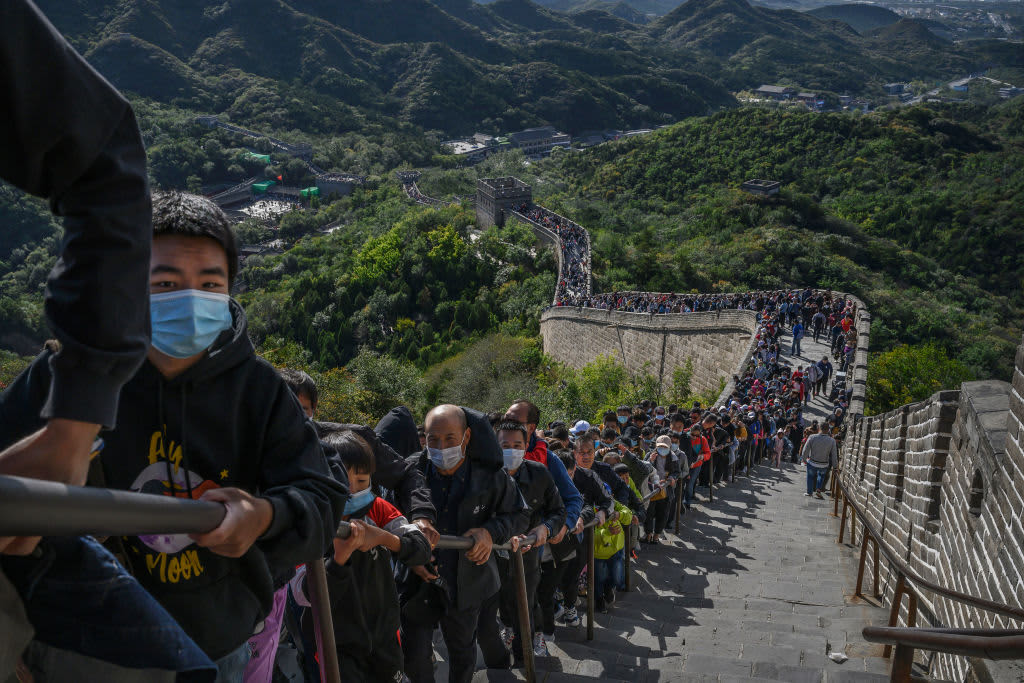More than 637 million people traveled within China over the past week in celebration of the country’s annual “Golden Week,” the country’s government said on Friday.
The government estimates domestic travelers generated around 466 billion yuan ($68.6 billion) in tourism revenue during the holiday period.
Two holidays converged this year: National Day, which celebrates the founding of the People’s Republic of China on Oct. 1, 1949, and the Mid-Autumn Festival, which is set by the lunar calendar. As a result, the usual week-long holiday was expanded to eight days, making Golden Week the longest holiday period of the year.
While less than the 782 million tourists who traveled during Golden Week last year, China is celebrating the estimates as a rebound for its domestic travel industry.
Photographs from this year’s celebrations stand in stark contrast to scenes elsewhere in the world, where countries continue to struggle with rising coronavirus infection rates and muted economic activity.
China claims to have 205 active Covid-19 cases among its population of 1.4 billion people.
Hangzhou East Railway Station
Long Wei | VCG | Visual China Group | Getty Images
Crowds packed Hangzhou East Railway Station on Sept. 30, one day before the start of Golden Week. High-speed train tickets were sold out within hours of going on sale, according to China’s state-owned media.
Rail travel was expected to peak on Oct. 1, the first day of Golden Week (meaning things may have got busier than this).
The Bund in Shanghai
VCG | Getty Images News | Getty Images
Tourists jammed the expansive pedestrian walkways that line The Bund on Oct. 2.
Situated along the western bank of the Huangpu River, the 1.6-mile stretch is famous for its ornate architecture, with structures built in Gothic Revival, Neo-classical and Art Deco styles, among others, which have housed banks, office buildings, luxury hotels and social clubs through the years. The area sits in sharp contrast to the modern skyscrapers of Pudong — including the 128-story Shanghai Tower — that sits on the other side of the river.
“The bund is a reflection of Shanghai’s Western concession and also the starting point of the modern city of Shanghai,” said Dr. Jie Xu, an associate professor at Villanova University’s College of Liberal Arts and Sciences.
An amusement park in Wuhan
Zhang Chang | China News Service | Getty Images
A parade of giant pandas passed families visiting Wuhan Happy Valley theme park on Oct. 2. Xu likened the park to “a mini-Disney World or Six Flags in America,” stating it is “great for kids and family.”
The park reopened several months ago with a cap on daily visitors and social distancing requirements on rides.
Wuhan has not declared any new Covid-19 cases since May. China, however, does not count asymptomatic carriers of the virus as confirmed cases, according to the country’s National Health Commission.
The Great Wall outside of Beijing
Kevin Frayer | Getty Images News | Getty Images
Domestic tourists battled slow-moving lines as they steadily climbed the Great Wall of China on Oct. 4.
Though the Great Wall is some 5,500-miles long, it’s common to see this section, called Badaling, in photographs and tourist websites. Badaling is popular with domestic and international tourists for its picturesque meandering lines, well-preserved condition, and proximity to Beijing — it’s less than 40 miles away.
Longmen Grottoes in the Henan province
VCG | Visual China Group | Getty Images
Tourists flocked to see the Longmen Grottoes on Oct. 4, halfway through the Golden Week celebration period. The site is “a famous treasure house of stone inscriptions … reflecting the Buddhism culture,” said Xu.
A UNESCO World Heritage site located south of the city of Luoyang, the tourist attraction is home to more than 100,000 Buddha statues and 2,800 inscriptions that have been carved onto a 1-kilometer stretch of limestone cliffs and caves. UNESCO refers to the area as “the largest and most impressive collection of Chinese art of the late Northern Wei and Tang Dynasties.”
The ancient city of Xi’an
VCG | Visual China Group | Getty Images
Throngs of tourists walked the elevated city walls of Xi’an on Oct. 5. The ancient formation is one of the best-preserved walled cities in China with a walkable perimeter that is nearly 40 feet tall and over eight miles long.
Xi’an also draws tourists to see its “Terracotta Army,” a collection of over 8,000 life-sized statues found buried in pits outside of the city in 1974.
The streets of Hangzhou
Lian Guoqing | VCG | Visual China Group | Getty Images
Volunteers in face masks held hands to help control pedestrian traffic during Golden Week in Hangzhou on Oct. 6. During major public events, traffic can come to a standstill if pedestrians and drivers disregard traffic rules.
Hangzhou (population 7 million) is popular with tourists for its scenic West Lake and ancient water towns. It’s about an hour’s journey by train from Shanghai.
The Forbidden City in Beijing
Kevin Frayer | Getty Images News | Getty Images
On Oct. 6, Chinese tourists exited the Forbidden City, one of the most popular tourist sites in the country. Considered a masterpiece of Chinese architecture, the former imperial palace comprises 980 buildings spread over 180 acres in the middle of Beijing.
In August, the Chinese government eliminated mandatory mask requirements for residents of Beijing after the city reported 13 consecutive days without new coronavirus cases. Despite that, many people continue to wear masks for their own safety or due to societal pressure.
Shenzhen North Railway Station
Alex Tai | SOPA Images | LightRocket | Getty Images
As Golden Week winds down, Chinese travelers lined up at the boarding gate at Shenzhen North Railway Station on Oct. 7. It is one of four large railway stations in Shenzhen, a city home to more than 12 million people on the mainland near Hong Kong.
